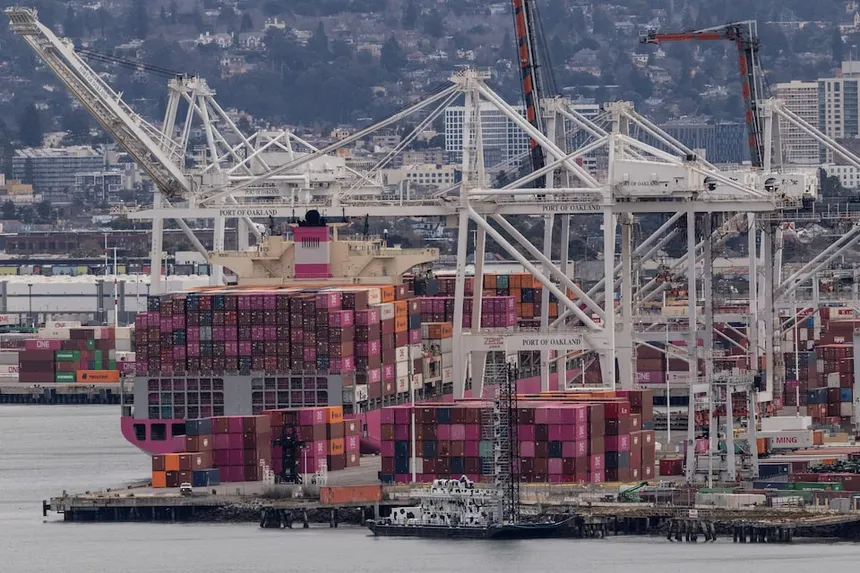The global economy is facing a fresh wave of uncertainty as the U.S. imposes new tariffs on imports from Mexico, Canada, and Europe. These tariffs are expected to shake international trade, impact stock markets, and create economic tension among major economies. Businesses, consumers, and investors worldwide are bracing for the ripple effects of these policy changes.
The New U.S. Tariffs: What’s Happening?
The U.S. government has announced new tariffs on key imports from Mexico, Canada, and Europe, a move that is already triggering strong reactions worldwide. These tariffs will affect industries ranging from automotive to agriculture and manufacturing, leading to concerns about supply chain disruptions and higher costs for consumers.

Key Details of the Tariffs
- Targeted Countries: Mexico, Canada, and several European nations
- Industries Affected: Automotive, steel, aluminum, agriculture, electronics, and consumer goods
- Percentage Increase: Tariffs ranging from 10% to 25%, depending on the product category
- Effective Date: Expected to take effect in the coming months, with potential further increases in the future
Immediate Impact on Global Markets
As expected, stock markets worldwide reacted sharply to the announcement. Investors are worried about rising costs for businesses and potential retaliatory measures from affected countries.
Stock Market Reactions
- Dow Jones & S&P 500: Experienced a sharp drop amid investor concerns.
- European Markets: Major stock indices, including the FTSE 100 and DAX, declined due to fears of economic instability.
- Asian Markets: The Nikkei and Hang Seng also saw declines, reflecting global economic uncertainty.
- Currency Fluctuations: The U.S. dollar strengthened against the Mexican peso and Canadian dollar but faced volatility against the euro.

How Will This Affect Businesses?
The tariffs will have a significant impact on businesses across various industries, particularly those reliant on international trade.
Industries Facing the Biggest Impact
1. Automotive Industry
- Car manufacturers relying on parts from Mexico and Canada will see production costs rise.
- Increased prices on imported vehicles could lead to lower sales and job cuts.
2. Steel & Aluminum Industry
- Higher tariffs will increase costs for U.S. companies using imported metals, impacting construction, manufacturing, and packaging industries.
3. Agriculture Sector
- Farmers exporting goods to Europe, Canada, and Mexico may face retaliatory tariffs, making U.S. agricultural products less competitive.
- Possible price hikes on food items due to increased import costs.
4. Technology & Electronics
- Supply chain disruptions could lead to higher prices on consumer electronics, such as smartphones, laptops, and home appliances.

Impact on Consumers
Consumers will likely feel the impact of these tariffs through higher prices on everyday goods.
Possible Effects on Households
- Higher Prices: Everything from groceries to electronics may become more expensive due to increased import costs.
- Job Market Instability: Companies affected by tariffs may cut jobs or delay hiring to manage rising costs.
- Reduced Product Choices: Some imported products may disappear from the market or become unaffordable for the average consumer.
Global Political and Economic Reactions
The new tariffs have sparked criticism and countermeasures from the affected countries, with many leaders warning of economic retaliation.
Reactions from Mexico, Canada, and Europe
- Mexico: Officials have condemned the move and are considering retaliatory tariffs on U.S. goods, particularly agricultural products.
- Canada: The Canadian government has warned of potential countermeasures, with Prime Minister calling the tariffs “unjustified and damaging to trade relations.”
- Europe: EU leaders have hinted at imposing their own tariffs on American products like whiskey, motorcycles, and luxury goods.
U.S. Government’s Justification
The U.S. administration argues that these tariffs are necessary to protect American jobs and industries, particularly in manufacturing and steel production. However, critics argue that the move could backfire, leading to job losses and economic slowdowns.
What Happens Next?
The coming months will be critical in determining how these tariffs reshape global trade dynamics. Possible outcomes include:
- Trade Negotiations: Countries may enter discussions to modify or eliminate the tariffs through agreements.
- Economic Retaliation: A trade war could escalate if affected nations impose their own tariffs.
- Market Volatility: Investors and businesses will need to brace for ongoing market fluctuations.
- Consumer Impact: Prices on goods and services may continue rising, impacting everyday life.
Conclusion
The new U.S. tariffs on Mexico, Canada, and Europe are already sending shockwaves through global markets. Businesses, consumers, and governments worldwide are closely watching how these changes will unfold. Whether this move strengthens the U.S. economy or triggers a larger trade war remains to be seen, but one thing is certain: the global economy is in for a turbulent ride.
Do Follow USA Glory For More Updates.






